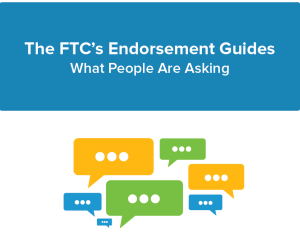 Endorsements and reviews are big in social media, they can be effective decision making tools for consumers if they are truthful. the FTC published endorsement guidelines to help brands and businesses stay out of trouble
Endorsements and reviews are big in social media, they can be effective decision making tools for consumers if they are truthful. the FTC published endorsement guidelines to help brands and businesses stay out of trouble
Suppose you meet someone who tells you about a great new product. She tells you it performs wonderfully and offers fantastic new features that nobody else has. Would that recommendation factor into your decision to buy the product? Probably.
Now suppose the person works for the company that sells the product – or has been paid by the company to tout the product. Would you want to know that when you’re evaluating the endorser’s glowing recommendation? You bet. That common-sense premise is at the heart of the Federal Trade Commission’s (FTC) Endorsement Guides.
The Guides, at their core, reflect the basic truth-in-advertising principle that endorsements must be honest and not misleading. An endorsement must reflect the honest opinion of the endorser and can’t be used to make a claim that the product’s marketer couldn’t legally make.
In addition, the Guides say if there’s a connection between an endorser and the marketer that consumers would not expect and it would affect how consumers evaluate the endorsement, that connection should be disclosed. For example, if an ad features an endorser who’s a relative or employee of the marketer, the ad is misleading unless the connection is made clear. The same is usually true if the endorser has been paid or given something of value to tout the product. The reason is obvious: Knowing about the connection is important information for anyone evaluating the endorsement.
Say you’re planning a vacation. You do some research and find a glowing review on someone’s blog that a particular resort is the most luxurious place he has ever stayed. If you knew the hotel had paid the blogger hundreds of dollars to say great things about it or that the blogger had stayed there for several days for free, it could affect how much weight you’d give the blogger’s endorsement. The blogger should, therefore, let his readers know about that relationship.
Another principle in the Guides applies to ads that feature endorsements from people who achieved exceptional, or even above average, results. An example is an endorser who says she lost 20 pounds in two months using the advertised product. If the advertiser doesn’t have proof that the endorser’s experience represents what people will generally achieve using the product as described in the ad (for example, by just taking a pill daily for two months), then an ad featuring that endorser must make clear to the audience what the generally expected results are.
Here are answers to some of our most frequently asked questions from advertisers, ad agencies, bloggers, and others.
Get the PDF FTC_Endorsement_Guides
